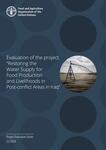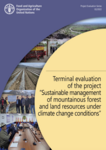Page Header
Overview
Bangladesh is highly susceptible to a range of annually reoccurring natural events such as flooding, water logging, cyclones, land erosion and droughts that, when combined with the low economic and resiliency levels of the population, contribute to a high number of acute onset emergencies and a range of chronic and complex emergencies. Compounding this, Bangladesh is more susceptible to the effects of climate change than any other country in the world. As investments for climate resilience grow in Bangladesh, there is a need to foster cross-sectoral planning and coordination, and to ensure coherence amongst the large number of climate-change and environment-related investments in the country. To this end, FAO has supported the government of Bangladesh in developing the first ever country investment plan for the environment, forestry and climate change sectors, with funding from USAID from 2013 to 2018. The mid-term evaluation of this project found that the creation of a country investment plan was highly relevant; however, the evaluation found that the timeframe for the project had been overly ambitious, and that more time, or indeed a second phase of the project would be needed to ensure sustainability of the results achieved. Furthermore, to enable meaningful cross-sectoral collaboration, the evaluation noted that the project should focus on building relations with other relevant ministries outside the Ministry of Environment and Forests. Given the need for further support and to ensure a fully operational country investment plan is in place, the evaluation suggested possible focus areas for a potential second phase of the project.
Report Details
| Year Published | |
| Type | |
| Joint | No |
| Partner/s | N/A |
| SDG/s | |
| Agency Focal Point | Rebekah Bell; Eoghan Molloy |
| Focal Point Email | OED |
| Managed by Independent Evaluation Office | Yes |
| Geographic Scope | Country |
| Country/ies |



